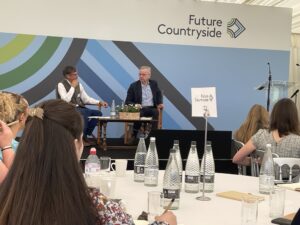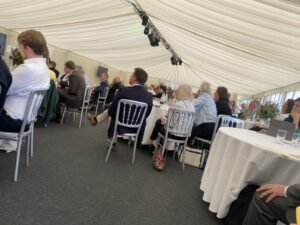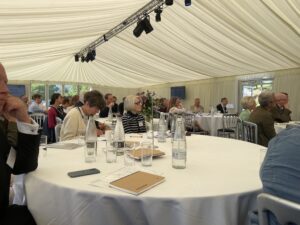SEM’s CEO had the opportunity to be invited to attend the 3rd Future Countryside Conference 2025, hosted by Lord William Burlington, Chair, Devonshire Group and Chatworth House Trust, attended by over 200 delegates from the environment, heritage, farming, business, Defra officials and young people.
In his welcome address, Lord Burlington said, the event sought to celebrate the countryside as a vibrant, inclusive landscape that benefits everyone, with a focus on positive impact and possibilities for rural economies and communities. He explained that, Chatsworth House is a great convener of people and indeed has been fulfilling that role for centuries and it was therefore of a tremendous honour to be hosting the event. Lord Burlington emphasised that Chatsworth Estates has worked hard to preserve and enhance the natural and cultural assets under their care for future generations and at the same time making significant contributions to the economic, environmental and social wellbeing of local communities of interest.

He explained that, there was need for greater understanding of what sustainable, resilient countryside looks like, and how vital it is for the nation’s future and that the Chatworth Estates will work to foster greater support, which in turn will help rural communities, cultures and landscapes across Britain, and beyond, to survive and thrive in the long term. Lord Burlington disclosed how across their commercial and agricultural estate and Chatsworth House Trust charity is spearheading a cultural programme, learning and outreach as they strive to build their outreach; relevance to neighbours, visitors and partners, their resilience in times of climate emergency and global uncertainty and their positive impact within the community and the wider world.

Founders of Future Countryside, Julian Glover and Nick Herbert said the vision is to create ‘A countryside for All’, as the countryside is part of our national heritage and what happens to it should matter to us all. It should be central to a modern vision of healthier, greener and more prosperous country. The countryside should not therefore be marginal to debate but rather build on a broader understanding of its core place in our collective future.

There were provocations on land use and the challenges facing the countryside especially access to the countryside. SEM’s CEO in his contribution said countryside access was not just about benevolence, and organising access for people from Black and ethnic minority communities to visit the countryside, but rather it is more about governance and representation. He explained that the countryside should be about our shared heritage as there has been the Black contribution made to the English countryside in terms of enslaved people, Black soldiers in the World Wars, this history should be told and cherished. Maxwell emphasised that the historical erasure of the Black presence in the English countryside is the reason behind access issues as Black people and other minorities are made to feel unwelcome in that space with rural communities failing to acknowledge the significant and important contributions made by Black and ethnic minorities to the English countryside. He was therefore of the view that so much academic research evidence supports the fact that access to the countryside is not about the absence of logistics and other resources as some speakers here at the conference would want us to believe, but deeper than that, and therefore in order to fashion out a better future of ‘A countryside for All’ would involve moving away from this old narrative.